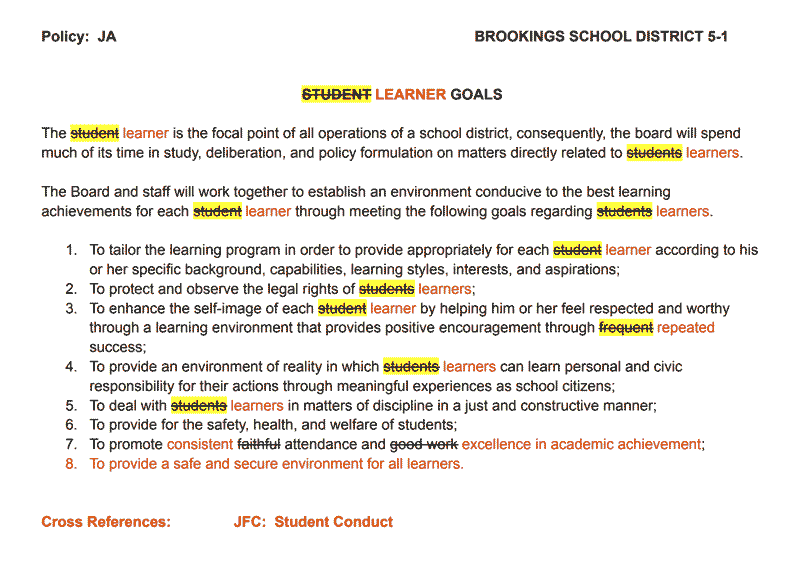A school board agenda was sent out in the last couple of days from the Brookings School District which might be one of the dumbest things I’ve ever heard of. As opposed to focusing on something that matters, they’re wasting time on terminology and where policies once talked about “students,” they’re scratching it out and writing “learners.”

Looking around, it seems to have been taking place for a while. And at least from first blush, it appears this effort might be springing forth from the Associated School Boards of South Dakota:

I’m sure calling them learners as opposed to students will be all warmer and fuzzier, and will make us feel better about ourselves… but what about state law?
While state law might talk about learners permits, or ‘english learner’ as someone who is not a native speaker, it really doesn’t use learner in the context of a child in school. State law calls them “students.” Period.
So why would the Associated School Boards be pushing this, given the language contained in law? Are they going to bring legislation this next session to change “student” to “learner” wherever it appears? Or are they advocating the Brookings School District and other school districts across the state use language in their policies and procedures which differs from what’s in state law?
Because it sounds darned .. unnecessary.

Is there a reason for this time-waster? Is there some insidious reason for it? I am always leery of anything so trivial being done by a public school system.
A guess: “Learner” will be either implicitly or explicitly defined in ways that justify/require the teaching of leftwing political views in the classroom.
Look for “learner” to be linked up with concepts like “diversity,” “inclusiveness,” “lived experiences,” “global perspectives,” “critical perspectives,” etc.,…. and then you’ll know it’s a trojan horse for leftist political indoctrination.
Which would explain why people are fighting so hard over a seemingly trivial word change. That’s how this stuff works. Control the language and you get to define reality — which includes defining leftwing indoctrination as neutral, cutting-edge teaching fit for children’s consumption.
Tbis is not only unnecessary…it is downright stupid. Unless it is part of a strategy as oulined above, which I wouldn’t put past a woke school board. A person in a school is a STUDENT, a learner is a lifelong thing.
Just curious.
What does the composition of the school board look like?
Translation: How many liberal, snowflake, democrat, radicals, are on the board?
They may also want to consider eliminating the Pledge of Allegiance in the district too.
This is great. State funding is allocating based on students, so if Brookings doesn’t have any students, I guess the state won’t need to worry about funding them any more!
Amusing that the ASBSD quote misspells “learner” as “leaner.”
If learner is used, schools should be then tasked to produce increased scores for everyone who is called ” learner.” Otherwise it is false information.
Just curious.
What does the composition of the school board look like?
Translation: How many liberal, snowflake, democrat, radicals, are on the board?
They may also want to consider eliminating the Pledge of Allegiance in the district too.
Why would we change from students?
The word ” student” is from Latin: “studium” or “painstaking application,”
In other words, studying is hard work.
Learning is much easier. Effortless, really.
And a world in which nobody works is a progressive ideal.
It’s a derangement far less dangerous when the deranged aren’t in power.
It all started when teachers became educators. As South Dokotites we need to stop this madness.
This reminds me a bit of when I was enrolled in a “progressive” educational experiment at UMass in 1968. It was called project 10. At the time, everybody was reading the book “Summerhill” and extolling the benefits of experiential learning. No didactic or pedantic teaching. In fact, if you look up didactic and pedantic, they used to be neutral terms, now they are both considered derogatory.
(And it alarms me that just trying to discuss this I have plunged myself into the bullshit jabberwocky you can read in any professional education journal like the ones my daughter-in-law, who holds an EdD from Harvard, leaves in the bathroom. It is tempting to use the pages as a substitute for 🧻 !)
This is where they are going with this, Just as didactic and pedantic have become negative terms, “student” will become equally derogatory, and future “learners” will be insulted if you call them students.
This needs to be cut out at the root.
Pat, it is more than unnecessary. These people are ignorant morons to want to minimize a person is choosing to their institution to learn and proving they are incompetent to be entrusted students/learners/teachers or anyone else.
By definition, a student is a person who is studying at a school. By definition, a learner is learning a subject or a skill.
The difference: The student is attending a school. A learner is a more generic term as one can be a learner at work, at home, at school. Anywhere.
By the way, since I hope the teachers and students are both “learners,” why don’t we call merger them both and call them learners and they trade-off responsibilities? Makes as much sense as this.